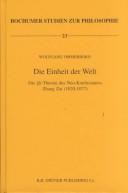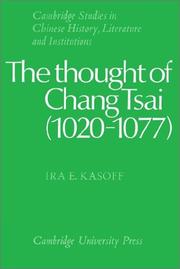| Listing 1 - 3 of 3 |
Sort by
|

ISBN: 1283327929 9786613327925 9027276331 9789027276339 9060323440 9789060323441 9781283327923 6613327921 Year: 1996 Publisher: Amsterdam Philadelphia B.R. Grüner
Abstract | Keywords | Export | Availability | Bookmark
 Loading...
Loading...Choose an application
- Reference Manager
- EndNote
- RefWorks (Direct export to RefWorks)
Der Neo-Konfuzianismus bildet mit seinen verschiedenen Strömungen die wichtigste Geistesschule des imperialen China seit der Song-Zeit (960-1279). Er entstand als Reaktion auf die das chinesische Denken in den Jahrhunderten vorher stark beeinflussenden Schulen des Buddhismus und des Neo-Daoismus und versteht sich selbst als eine Rückkehr zu der Essenz der ursprünglichen konfuzianischen Lehre vor der Han-Zeit (206 v.u.Z.-221 n.u.Z.). Wesentliche Elemente in den Theorien der beiden gegnerischen Schulen wurden aber vom Neo-Konfuzianismus absorbiert und haben ihn ohne Zweifel bereichert und neue E
Neo-Confucianism. --- Philosophy, Chinese. --- Chinese philosophy --- Confucianism --- Philosophy, Chinese --- Zhang, Zai, --- Chang, Tsai, --- Chang, Chae, --- 장재, --- 张載, --- Hengquxiansheng, --- Heng-chʻü-hsien-sheng, --- 橫渠先生, --- Zhang, Hengqu, --- Chang, Heng-chʻü, --- 張橫渠, --- Zhang, Zihou, --- Chang, Tzu-hou, --- 張子厚, --- Chang, Tsai --- Neo-Confucianism
Book
ISBN: 073919237X 9780739192375 9780739192368 0739192361 Year: 2015 Publisher: Lanham, Maryland
Abstract | Keywords | Export | Availability | Bookmark
 Loading...
Loading...Choose an application
- Reference Manager
- EndNote
- RefWorks (Direct export to RefWorks)
Jung-Yeup Kim is assistant professor of philosophy at Kent State University.
Qi (Chinese philosophy) --- Philosophy, Chinese --- Chʻi --- Chʻi (Chinese philosophy) --- Ki (Chinese philosophy) --- Vital force --- Zhang, Zai, --- Chang, Tsai, --- Chang, Chae, --- 장재, --- 张載, --- Hengquxiansheng, --- Heng-chʻü-hsien-sheng, --- 橫渠先生, --- Zhang, Hengqu, --- Chang, Heng-chʻü, --- 張橫渠, --- Zhang, Zihou, --- Chang, Tzu-hou, --- 張子厚,

ISBN: 052125549X 0521529476 0511558511 Year: 1984 Publisher: Cambridge Cambridge University press
Abstract | Keywords | Export | Availability | Bookmark
 Loading...
Loading...Choose an application
- Reference Manager
- EndNote
- RefWorks (Direct export to RefWorks)
Chang Tsai is one of the three major Chinese philosophers who, in the eleventh century, revitalised Confucian thought after centuries of stagnation and formed the foundation for the neo-Confucian thinking that was predominant till the nineteenth century. The book analyses in depth Chang's views of man, his nature and endowments, the cosmos, heaven and earth, the problems of learning and self cultivation, the ideal of the sage - and how that ideal might be attained. It looks at the intellectual climate of the eleventh century, the assumptions Chinese intellectuals shared, and the problems which concerned them. It describes the triumph of Chang's rivals within the neo-Confucian movement and the subsequent emergence of neo-Confucianism to state orthodoxy in the thirteenth century.
S12/0230 --- S12/0430 --- Philosophy, Chinese --- Chinese philosophy --- China: Philosophy and Classics--Chinese philosophy: Sui and Tang --- China: Philosophy and Classics--Neo-Confucianists: general and Song (including lixue 理學) --- Chang, Tsai --- Philosophy, Chinese. --- Zhang, Zai, --- Chang, Tsai, --- Chang, Chae, --- 장재, --- 张載, --- Hengquxiansheng, --- Heng-chʻü-hsien-sheng, --- 橫渠先生, --- Zhang, Hengqu, --- Chang, Heng-chʻü, --- 張橫渠, --- Zhang, Zihou, --- Chang, Tzu-hou, --- 張子厚, --- Arts and Humanities --- History
| Listing 1 - 3 of 3 |
Sort by
|

 Search
Search Feedback
Feedback About UniCat
About UniCat  Help
Help News
News